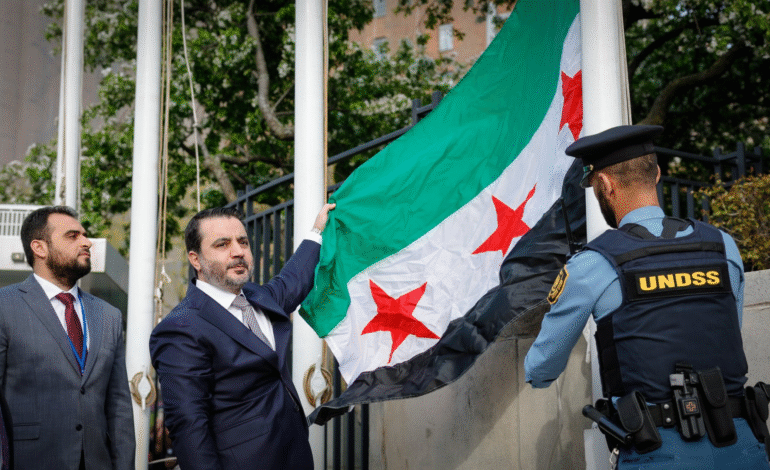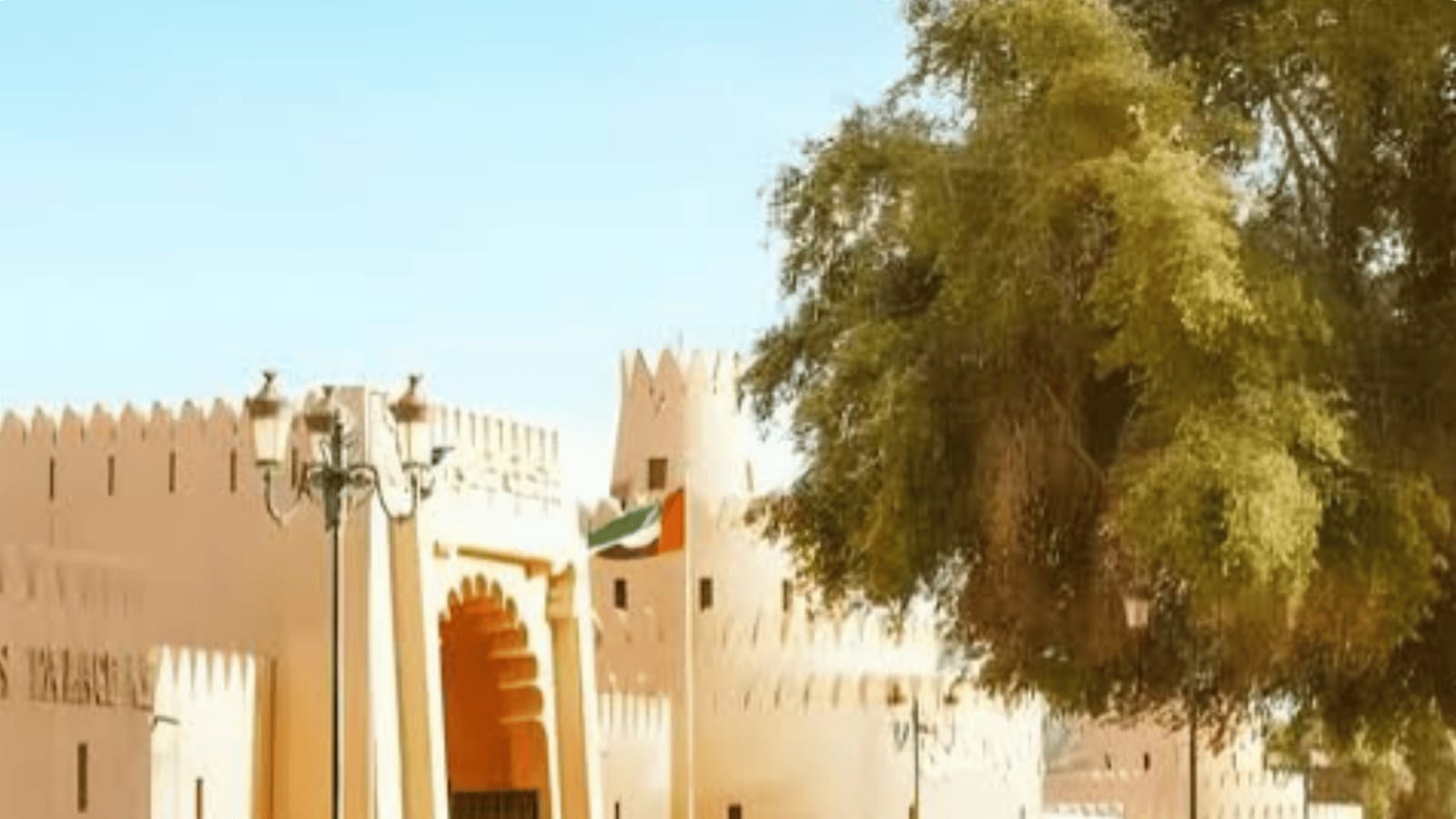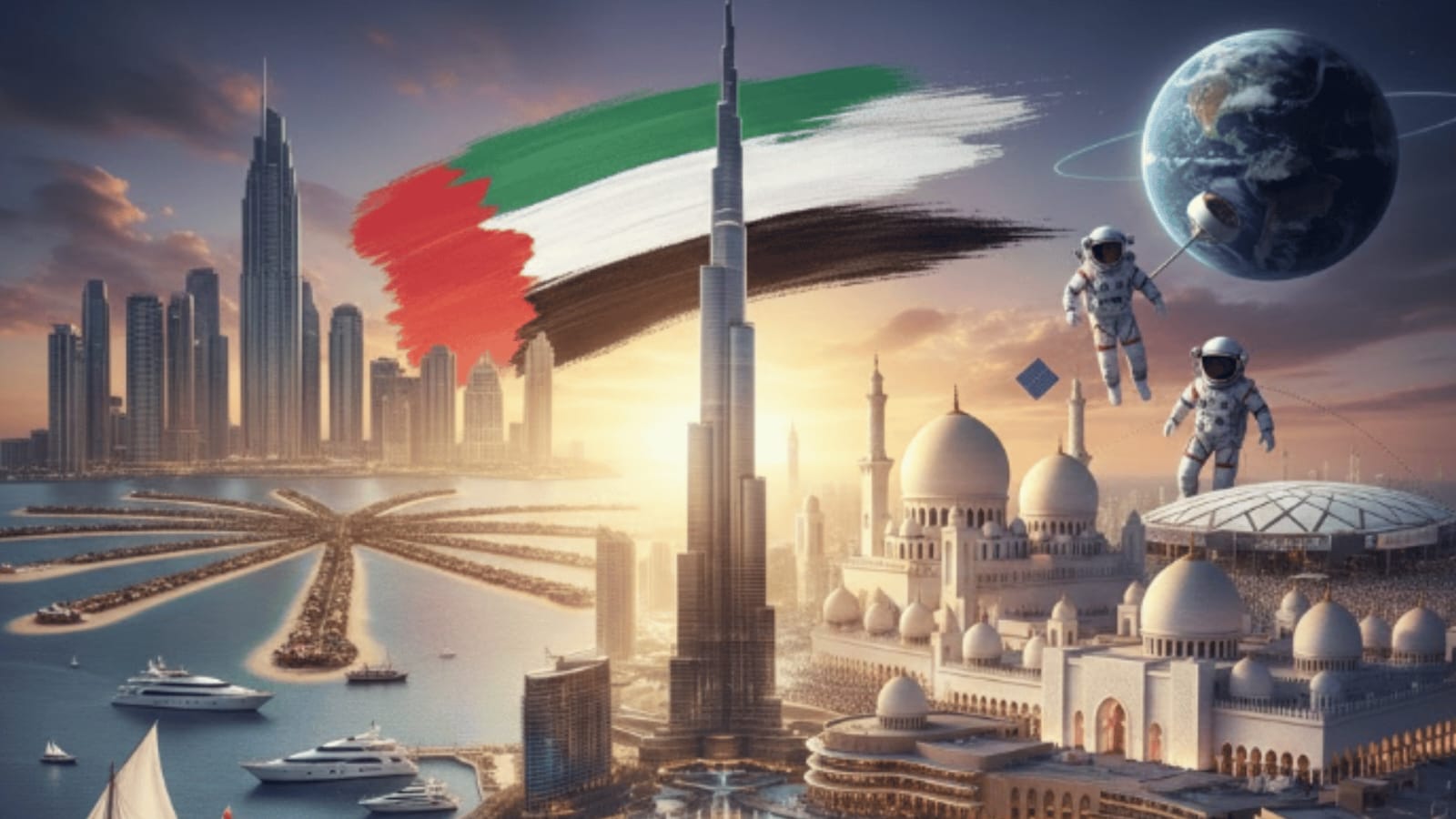Syria’s New Flag Raised at United Nations During Key Visit

In a significant public event, Syrian Foreign Minister Asaad Al Shibani raised his nation’s new flag at the United Nations headquarters. The moment, which unfolded during a UN Security Council briefing, marked the first appearance by a high-ranking Syrian government official in the United States since major political shifts occurred within Syria. The ceremony came as part of a broader diplomatic effort by the new Syrian authorities to reintroduce themselves onto the international stage.
The newly raised flag, featuring three stars, replaces the two-starred version previously associated with the Syrian state. Interestingly, the three-starred flag had been historically used by opposition groups during earlier phases of conflict. Its adoption now as Syria’s official national emblem signals a notable shift in the country’s political identity and internal reconciliation efforts.
The flag-raising event was watched closely by diplomats and observers, who see it as part of Syria’s attempt to engage with the international community more actively, especially with Western nations.
Syria’s Delegation Engages With Global Financial and Political Institutions
The Syrian delegation’s visit to the United States was not limited to the United Nations. Officials also traveled to Washington, D.C., to attend meetings at the World Bank and the International Monetary Fund. These engagements underline Syria’s broader ambitions to reestablish its connections with key global financial institutions.
The presence of Syrian officials at such high-profile international forums marks a distinct phase in Syria’s post-conflict trajectory. It indicates a willingness to participate more actively in global conversations regarding development, financial support, and international cooperation. While economic sanctions continue to weigh heavily on Syria’s economy, officials appear optimistic that increased engagement will pave the way for gradual improvements.
Foreign Minister Shibani expressed hope that Syria’s renewed openness would be reciprocated by the international community. Speaking to the Syrian state news agency, he emphasized that Syria expects to be treated fairly and equally by global partners, especially considering what he referred to as the removal of previous reasons for sanctions.
Complex Dynamics Surrounding Sanctions and Recognition
Despite Syria’s proactive diplomatic outreach, formal recognition by the United States has not yet been granted. The Trump administration has continued to uphold longstanding sanctions, although some minor temporary relief measures have been introduced. No official meetings between Syrian officials and senior US administration members were confirmed during Shibani’s visit.
Foreign Minister Shibani’s remarks reflected a broader message aimed at international audiences: with perceived changes on the ground and within the country’s governance, the justification for sanctions, in Syria’s view, no longer stands. He urged that, consequently, sanctions should be lifted to enable Syria to rebuild and reintegrate more fully into the global community.
Yet, the situation remains complex. US sanctions were initially imposed based on a range of concerns, including human rights issues, security threats, and regional stability. Removing or easing these restrictions would likely require careful consideration and verification of substantive changes in Syria’s domestic and foreign policies.
Congressional Delegation’s Unofficial Visit to Damascus
In a parallel development, two US Republican congressmen, Representatives Marlin Stutzman of Indiana and Cory Mills of Florida, visited Damascus shortly before the UN flag-raising event. The visit, organized by a Syrian-American nonprofit group, offered rare direct contact between American lawmakers and Syrian officials in recent times.
During their stay, the congressmen met with President Ahmad Al Sharaa and other senior figures within the Syrian government. Although the visit was unofficial and not sanctioned by the US government, it provided an opportunity for dialogue on sensitive issues, including the conditions under which sanctions might eventually be lifted.
Congressman Mills emphasized that any final decision regarding sanctions would ultimately lie with the US president, but that congressional discussions and advisories could help shape the path forward. He outlined key concerns that would need to be addressed before serious consideration of sanctions relief, including commitments on counterterrorism, chemical weapons, and relations with neighboring countries.
The meetings highlighted the intricate nature of diplomatic engagement, where unofficial contacts sometimes pave the way for more formal negotiations in the future.
Syria’s Stance on Regional Relations and Security Commitments
One noteworthy aspect of the discussions was Syria’s stated willingness to explore normalized relations with Israel, a development that would represent a major shift in Middle Eastern geopolitics. According to Congressman Mills, President Sharaa expressed openness to normalization “under the right conditions,” though no specifics were disclosed.
The possibility of future Syrian-Israeli engagement was received with cautious interest by international observers. For decades, relations between Syria and Israel have been characterized by hostility and unresolved territorial disputes. Even a preliminary willingness to engage in dialogue represents a significant departure from previous policies.
Security assurances to Israel, effective counterterrorism cooperation, and the handling of foreign militant fighters were mentioned as potential building blocks for a broader regional settlement. These topics will likely remain central to any ongoing or future discussions involving Syria’s international reintegration.
Broader Global Response to Syria’s Diplomatic Efforts
Beyond the United States, reactions from other Western nations appear somewhat more receptive. Some European countries have started to gradually re-engage with Syria’s new authorities, signaling a cautious warming of relations. Diplomatic missions, trade delegations, and informal talks have resumed in certain cases, reflecting a pragmatic approach to changing realities on the ground.
Still, full diplomatic normalization remains distant for many nations. The path forward will likely require Syria to demonstrate continued commitment to international norms, address humanitarian concerns, and contribute constructively to regional stability.
Syria’s reentry into the international diplomatic community will depend not only on symbolic gestures like flag-raising but also on sustained efforts to build trust, ensure transparency, and promote peaceful coexistence within and beyond its borders.
United Nations Platform as a Stage for New Beginnings
The United Nations has historically served as a platform for countries undergoing major political transitions to reassert their sovereignty and reengage with the world. For Syria, raising the new flag at the UN represents not merely a symbolic act but a public assertion of its renewed national identity.
It is also an invitation to the international community to consider Syria’s evolving situation with fresh eyes. Whether this gesture will translate into tangible diplomatic achievements remains to be seen, but it undoubtedly marks a new chapter in Syria’s relations with the world.
Foreign Minister Shibani’s emphasis on openness and equal treatment echoes broader principles enshrined in the UN Charter, including respect for national sovereignty and the promotion of peaceful international cooperation.
An Evolving Landscape of Diplomacy and Engagement
The raising of Syria’s new flag at the United Nations stands as a potent symbol of change and aspiration. It reflects a desire to move beyond years of conflict and isolation toward a future marked by dialogue, development, and greater international integration.
At the same time, the complex realities of global diplomacy mean that progress will depend on substantive actions, ongoing dialogue, and a commitment to addressing longstanding concerns. Engagements like the ones seen in Washington and New York offer glimpses of potential pathways forward.
While the road ahead remains uncertain and challenges persist, Syria’s recent diplomatic moves highlight the enduring power of international engagement and the importance of diplomacy in shaping a more connected and peaceful world.








1 Comment
[…] The United Nations has once again called for an immediate ceasefire in Ukraine, emphasizing that any peace effort should respect the country’s sovereignty, independence, and internationally recognized borders. This announcement comes as the United States and Russia prepare for a summit in Alaska, where leaders are expected to discuss ways to reduce tensions and explore constructive solutions. […]
Comments are closed.